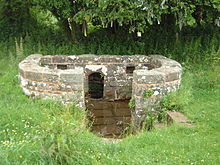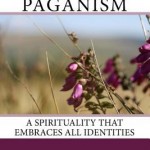
Interestingly, many Pagans (including myself) seem to prefer the word “sacred” to the word “holy”.
To me, ‘sacred’ implies something that celebrates the sanctity of being alive, and it can include the erotic and the wild.
‘Holy’, on the other hand, implies abstinence from the erotic and embracing ‘civilisation’.
Interestingly, the first sense of ‘sacred’ offered by the Merriam-Webster dictionary uses a Pagan-sounding example:
Definition of SACRED
- a : dedicated or set apart for the service or worship of a deity <a tree sacred to the gods>
b : devoted exclusively to one service or use (as of a person or purpose) <a fund sacred to charity>- a : worthy of religious veneration : holy
b : entitled to reverence and respect- : of or relating to religion : not secular or profane <sacred music>
- archaic : accursed
- a : unassailable, inviolable
b : highly valued and important <a sacred responsibility>
Whereas ‘holy‘ is defined using Christian and monotheistic examples:
Definition of HOLY
- : exalted or worthy of complete devotion as one perfect in goodness and righteousness
- : divine <for the Lord our God is holy — Psalms 99:9 (Authorized Version)>
- : devoted entirely to the deity or the work of the deity <a holy temple> <holy prophets>
- a : having a divine quality <holy love>
b : venerated as or as if sacred <holy scripture> <a holy relic>- —used as an intensive <this is a holy mess> <he was a holy terror when he drank — Thomas Wolfe> ; often used in combination as a mild oath <holy smoke>
Of course, some Pagans do use the word ‘holy’ occasionally. Here are a couple of examples.
- How to make Pagan holy water. Once the author has established that holy water was used by the ancient Greeks and is not restricted to Christian practice, the author subsequently refers to blessed water.
- Pagan sacred space. This article by Carl McColman (now a Catholic, but presumably still a Pagan when he wrote it) uses the term holy as synonymous with sacred at one point, but then reverts to using sacred throughout the rest of the article.
However, the word ‘sacred’ is much more frequently used in contemporary Pagan discourse. (Google for Pagan + sacred versus Pagan + holy if you don’t believe me!)
Wiktionary unpacks the etymology of ‘holy’:
From Middle English holi, hali, from Old English hāliġ, hāleġ (“holy, consecrated, sacred, venerated, godly, saintly, ecclesiastical, pacific, tame”), from Proto-Germanic*hailagaz (“holy, bringing health”), from Proto-Germanic *hailaz (“healthy, whole”), from Proto-Indo-European *koil- (“healthy, whole”). Cognate with Scots haly (“holy”), Dutch heilig (“holy”), German heilig (“holy”), Swedish helig (“holy”). More at whole.
The Old English connotation of ‘tame’ bears out my idea that the term ‘sacred’ can include wildness, but ‘holy’ cannot.
Interestingly, when an Anglo-Saxon Heathen set out to create sacred space, it was space set apart from the surrounding land, which was inhabited by spirits regarded as malevolent.
The etymology of sacred comes from Middle English, but ultimately from Latin.
From Middle English sacred, isacred, past participle of Middle English sacren, sakeren (“to make holy, hallow”), equivalent to sacre + -ed.
Wikipedia defines ‘holy’ as associated with the Divine, whereas ‘sacred‘ is associated with something more generally consecrated for ritual use:
holy (perceived by religious individuals as associated with the divine) or sacred (considered worthy of spiritual respect or devotion; or inspiring awe or reverence among believers in a given set of spiritual ideas).
So ‘sacred’ is used as a more general term without reference to the Divine.
Pagans use the term ‘sacred’ to refer to sacred space (usually a place consecrated for ritual), sacred sites (usually places that feel special and numinous, often because they were used for ritual in the past, such as stone circles, burial mounds, and holy wells), and sacred sexuality (consensual sexual activity for a spiritual purpose).
The word ‘holy’ is generally used only when it would be more easily understood by a general audience, in phrases which are already in general usage like ‘holy book‘, ‘holy well’, ‘holy water’.
Initially, I thought that the Pagan aversion to the term ‘holy’ was just an adverse reaction to its usage in Christian discourse, but I think the avoidance of it may be due to something deeper — the widespread Pagan view that everything is sacred in its own right, and does not depend on divinity to sanctify it. In addition to this, the connotations of ‘holy’ include abstinence from sex, whereas ‘sacred’ can include sexuality. In Christian discourse, ‘holy’ appears to mean something directly affected by God, whereas ‘sacred’ appears to mean something consecrated by humans. In Pagan usage, the sacredness of a thing or place can be either an inherent quality, or something conferred on it by using it in a ritual, or consecrating it. If we wanted to say that something was directly affected by, or associated with, a deity, perhaps we might use the term ‘holy’. The phrase ‘Holy Names’ appears in a Gardnerian Book of Shadows dating from 1957.
What do you think? Do you prefer ‘sacred’ or ‘holy’, and why?
















